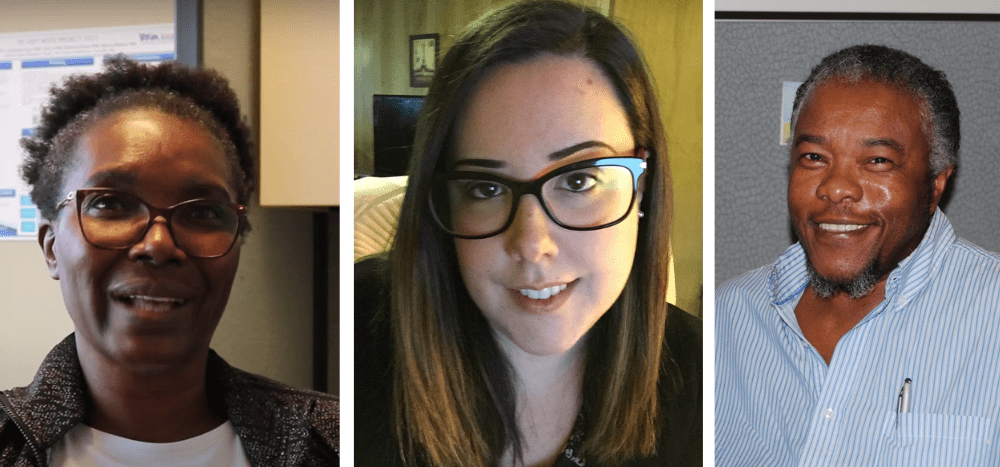Annual PALLIES Education Symposium focuses on unique psychosocial outcomes of palliative care

Elizabeth Siwoku, PSW (left), Allison Cooke, Clinical Educator (centre) and Akil Ade, Nursing Supervisor, played roles in organizing and presenting PALLIES 2021.
On October 7, VHA Home HealthCare (VHA) held its second annual Palliative Interprofessional Education Symposium, also known as PALLIES. This year’s theme was Psychosocial Domains of Palliative Care. VHA personal support workers, rehab service providers and nurses specializing in palliative care were joined by external experts in the field as well as other individuals from within the VHA community.
The group gathered virtually with the goals of gaining knowledge and practical strategies when caring for clients and families with a life-threatening illness, understanding how to engage in therapeutic conversations in palliative care, working through grief and exploring aspects of culturally sensitive care through a Muslim lens. Read on to learn more about VHA’s PALLIES 2021 presentations.
The Psychological Impact of Living with a Life-Threatening Illness
Dean Walters, a Nurse Practitioner working with Central East Home & Community Care Support Services, kicked off PALLIES 2021 with an insightful talk about the psychological impact of living with a life-threatening illness. Dean’s presentation centred around society’s current relationship to death, referring to the concept of immortalization, or not relating to one’s own death.
“Today, our relationship to death often begins in the health care system, stewarded by health care providers who do not believe in a purpose for death nor in anything after death. For the dying, depression and anxiety on death are nourished within this system,” said Dean.
Dean shared that in order to initiate and conduct therapeutic conversations with the dying and their families, it is useful for health care providers and their organizations to foster relationships with death. Dean shared tools for doing so and facilitated a discussion where VHA staff and service providers shared their personal experiences and feelings towards end-of-life.
Therapeutic Conversations in Palliative Care
Jennifer Tedford also presented at PALLIES. The focus of her presentation was on therapeutic conversations in palliative care. Jennifer is a Thanadoula, a supportive figure/practitioner who spiritually and emotionally guides families and individuals through end-of-life experiences.
Differing from social conversations, therapeutic conversations specifically have a conscious intention or aim and are often in-depth or emotional. The focus of these communications is primarily on a patient or client.
During Jennifer’s presentation, she outlined steps and best practices to follow when engaging in therapeutic discussions, including ways to build trust and gain insights and information about clients and their support systems as well as coping tools to ensure each conversation feels supportive.
My Story of Grief
VHA Palliative PSWs Lilly Li and Elizabeth Siwoku were invited to journal their responses to questions about their personal experiences and conversations about death for a video that was presented at PALLIES. In the video below, they share what they wrote, touching on their stories of grief while working in the field of palliative home care.
The Islamic Home Care Paradigm
VHA’s Akil Ade, RN and Best Practice Supervisor—Combined Palliative Care Program, closed PALLIES 2021 with a presentation on the Islamic home care paradigm. Akil reviewed current palliative care frameworks that guide today’s modern practice. He then shared comprehensive research about what a “good death” means from an Islamic perspective and a needs survey completed by members of the Muslim community within the Greater Toronto Area.
“How do we support formal caregivers to feel at home with Muslim clients? In western non-Muslim homes, it is easier to make connections, because there are common values, beliefs, and culture nuances. The missing piece to equitable, client-focused palliative care for the Muslim client is formal caregiver education of Islamic norms,” said Akil.
Akil shared recommendations and next steps that came out of the research outlined in his presentation, including more education for field staff on Islamic practices, ensuring there is Muslim representation in client advocacy groups and recognizing the importance of the Masjid and other spiritual practices in end-of-life for Islamic individuals.
The diverse presentations at PALLIES gave VHA’s interprofessional palliative care providers a lot of thoughtful information to consider as well as useful guidance to incorporate into their daily practice. It was a certainly a valuable day for everyone who took part!
